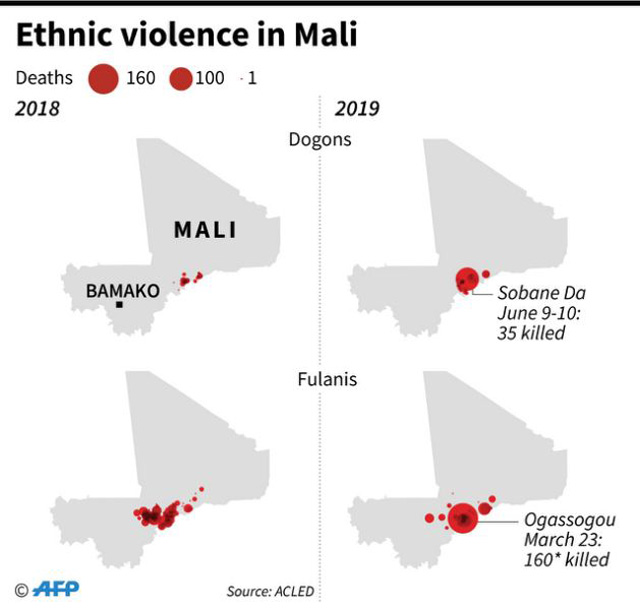
Bamako, Mali | AFP | The Malian government on Wednesday sacked the governor of the central Mopti region following a village massacre in which 35 people died.
Three days of national mourning would also be held “in homage to the victims of the terrorist attack perpetrated on June 10, 2019 against the population of Sobane Da village,” President Ibrahim Boubacar Keita said in a statement read out on public television.
“Drawing lessons from this tragedy, the cabinet had dismissed Mopti’s regional governor,” General Sidi Alassane Toure added in the statement.
Twenty-four of the dead were children, the government said earlier in a statement which added that six people had been detained “following routine checks”.
Authorities revised the death toll down to 35 from an estimated 95.
In another incident Wednesday, an attack on villages of the Dogon ethnic group in the south of country claimed at least two lives, with several others wounded, a local official and a Malian security source said.
Gunmen late Sunday surrounded the village of Sobane Da, in a Dogon enclave, killing inhabitants and torching homes in a seven-hour assault, survivors said.
The killings stirred fears of tit-for-tat violence in the region, an ethnic patchwork where tensions have soared since the emergence of a violent jihadist-led movement in 2015.
The government had given a provisional figure of 95 dead and 19 missing.
That toll was based on early information from soldiers and the district mayor who visited the village, which is also known as Sobane-Kou.
But by Monday night there was some doubt and the revised figure was confirmed the following day, officials said.
“This number is based on a painstaking count carried out by a team comprising officials from the (Malian) civil protection force, forensic doctors (and) the public prosecutor of Mopti” region, Wednesday’s statement said.
About a hundred women had succeeded in fleeing to the village of Koundo, and this was one of the causes of the confusion, it said.
The government, referring to the risk of another turn in the cycle of violence, also urged local people “not to fall into the trap of guilt by association and revenge”.
– Troubled region –
Ethnic violence in central Mali surged after a predominantly Fulani jihadist group led by preacher Amadou Koufa emerged in 2015.
On May 16, the UN peacekeeping mission in Mali, MINUSMA, announced it had recorded “at least 488 deaths” in attacks on Fulanis in the central regions of Mopti and Segou since January 2018.
Armed Fulanis “caused 63 deaths” among civilians in the Mopti region over the same timespan, it said.
In the bloodiest raid, about 160 Fulani villagers were slaughtered on March 23 at Ogossagou, near the border with Burkina Faso, by suspected Dogon hunters.
The Fulani are primarily cattle breeders and traders, while the Bambara and Dogon are traditionally sedentary farmers.
In the heart of the Sahel, Mali is one of the world’s poorest countries.
Unrest in the volatile central region coincides with an ongoing jihadist campaign that the Mali government is struggling to contain, despite military support from France and UN peacekeepers.
– Falling trust –
Analysts said public confidence in the government had slumped, spurring the creation of so-called self-defence groups.
“The militias, rightly or wrongly, were created to respond to a need for security among people who no longer have any trust, or very little, in the effectiveness of the institutional responses,” said Baba Dakono of the Institute for Security Studies(ISS), a think tank in Bamako.
An expert working for an aid group in France, speaking on condition on anonymity, criticised the government for a response that had been “above all repressive”, especially towards the Fulani community.
The military, he added, had been deployed about 20 kilometres (12 miles) from the massacre yet had been unable to prevent it.
“They are facing enemies who take multiple forms and the threats are pretty much everywhere. They are rather overwhelmed,” he said.
In a separate development on Wednesday, the French military said three people were killed in northern Mali when a French counter-terror unit opened fire on a vehicle that failed to halt for inspection.
The incident took place on Saturday west of Timbuktu, one of three northern Malian towns that were recaptured by French and Malian forces in 2013 but which is still periodically attacked by jihadists.
 The Independent Uganda: You get the Truth we Pay the Price
The Independent Uganda: You get the Truth we Pay the Price



